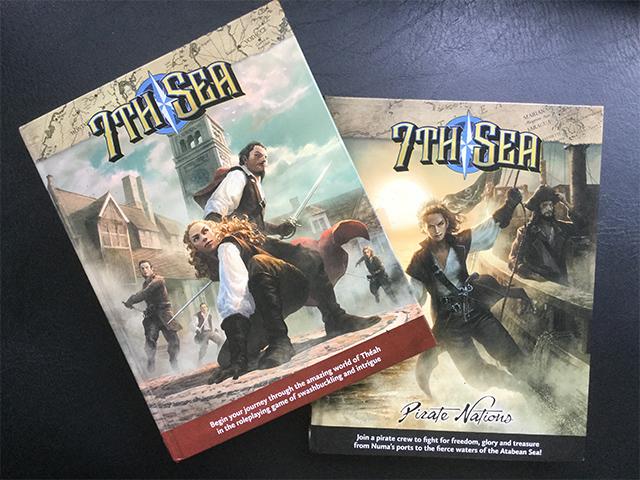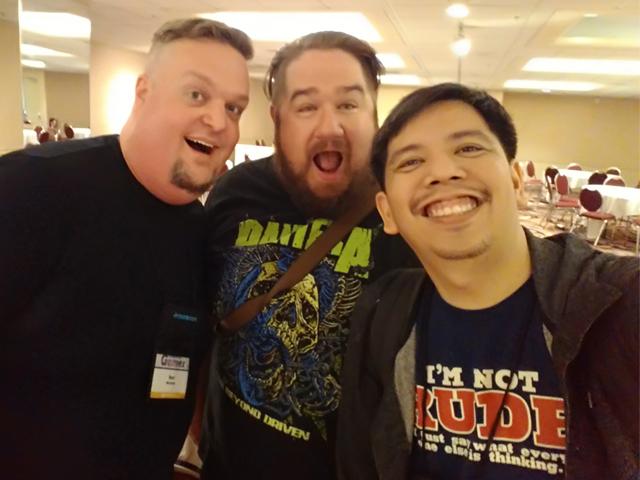Pinoy helped shape award-winning ‘7th Sea: Pirate Nations’ RPG
What does it take to play in the big leagues? Dedication to your craft, and the courage to share your talents with the world.
When Filipino game designer Tobie Abad started developing tabletop role-playing games (RPGs) in the ‘90s, he probably entertained dreams of one day working on the industry’s biggest franchises. His efforts would eventually bear fruit, and he would go on to participate in various international projects, one of the most significant being “7th Sea: Pirate Nations,” the supplement to “7th Sea.”
“7th Sea” was extremely popular in the ‘90s. Last year, its second edition became one of the most successful RPG Kickstarters.
At the 2017 ENnie Awards, the updated “7th Sea” took home numerous awards, including a Gold ENnie for Best Rules and a Silver ENnie for Best Game. “7th Sea: Pirate Nations” won a Silver ENnie in the Best Supplement category.
“ ‘7th Sea’ is a diverse world of swashbuckling adventure set in Theah, a place sorta-like-but-not-quite Europe,” said Abad.
“‘Pirate Nations’ adds to that wonderful world by expanding on the available Nations to include Numa (not Greece), Jaragua, and more. This expanded the game in so much more ways allowing greater diversity and even shades of gray among its heroes.”
But what was it like working with an international team on a project as huge as “7th Sea: Pirate Nations”?

Reimagining a world
Abad was given the responsibility of developing one of the significant locations in the world of “7th Sea: Pirate Nations.”
“I was tasked as a freelance writer to come up with the reimagination of La Bucca, the prison island that has turned into an independent nation of intrigue and freedom,” Abad explained. “This meant coming up with a somewhat similar yet new history for the island, locations of interest, plot hooks, and characters to meet.”
While Abad retained elements that defined La Bucca in the original “7th Sea,” he contributed many new ideas to the update.
“At first, I was given free rein to write up the whole island. I maintained some similar hints to the original version—having La Bucca start out as a prison island, but after a faked plague outbreak, the prisoners took over the island. I added a few new ideas, such as the Chapters (the Eye, the Fin, the Tentacle, etc.) which embody the governing groups for key areas of influence on the island as well as added the idea that a monster of some sort may lurk beneath the waters of the island.”
Of his many updates to La Bucca, his favorites include the new characters.
“Baron Victor Maison is a pompous self-obsessed leader who was inspired by the Thenardiers from ‘Les Miserables.’ The Baron hates how the wealthy and influential treated him like dirt and now has fingers in every social gathering in the world that he can slip into. Him and the Mother of La Bucca, a woman who has the ability to travel to anyone needing her help. Both felt like nice opposite sides of the same coin.”
In addition to his work on La Bucca, Abad’s brainstorming sessions with a fellow game designer helped in the creation of a new game mechanic, one involving tattoo-centric Sorcery powers.
“That was really a lot more Ben Woerner’s work being given a jolt of inspiration while we were talking,” he said.
“We were thinking of a new magical power and I suggested to him the idea that maybe the Tattoos pirates have bear more meaning than expected. I was thinking of the Pintados of Visayas and of that villain from that old cartoon ‘The Super Globetrotters’ and offered to him the idea that the animals pirates tattoo on their skin actually grants them certain animal-specific powers.
“A shark tattoo allows one to attack well under the water. A turtle tattoo increases the toughness of the pirate when in the water. Which worked nicely with the thought that most pirates didn’t really know how to swim. He went with that conversation and made a whole cool system around it.”

Challenge and reward
Abad said that working with a diverse, international team proved “overwhelmingly” intimidating.
“There’s the facet of having to be in video conferences with people whom I admire and idolize in the industry, such as John Wick, who is the brains behind ‘Legend of the Five Rings,’ ‘7th Sea,’ and ‘Houses of the Blooded,’ as well as having your work looked through by other gaming icons such as Mark Diaz Truman, the brains behind Magpie Games and works such as ‘Our Last Best Hope’.”
Working on the game proved challenging. “I definitely had to worry about creating something that felt new and yet at the same time familiar,” Abad said. “During the early meetings, John cited ‘Battlestar Galactica’ as a good example of a successful reimagination of a brand. I had to dig back deep on what made La Bucca interesting back in the ‘90s and sought ways to give it a much more modern spin.”
He had to make certain adjustments to his writing style. “There was also the mental shift on how to adjust writing for a game line,” he said.
“Admittedly, I’ve always been used to writing for creative work and so writing for a game book needed to find a writing voice that was closer to academic without losing the fluidity and imaginative spark of creative writing.”
Abad said he enjoyed interacting with creative people, often remotely. “We used Slack to keep track of each other’s updates and Google Docs was very helpful in sharing work and seeing editing notes, he said. “I met a lot of other creative people to exchange ideas with and get feedback on work.”
Ultimately, working on “7th Sea: Pirate Nations” was a rewarding experience for Abad. He believes the game wouldn’t be where it is today without his team.
“The people who worked on the book worked very hard to make it a success,” he said. “Ben really found a diverse set of voices to contribute to the book. And I think the diversity offered by the book helped make it shine even more. The book covered five new settings to explore in the ‘7th Sea’ world as well as offered multiple new character options, Sorceries, and one of the most unique villains I’ve ever seen written up for a role-playing game, the Atabean Trading Company—a pyramid-scheme, economy-focused enemy.”
Abad said that the game’s win at the ENnie Awards was an “affirmation” that their hard work was appreciated.
“Personally, for me it was a dream-come-true moment. I know my parents aren’t completely clear about what a role-playing game is and why it has become such a passion for me, but to be able to let them know that I was part of a project that won such a huge award was something I’ve always wanted to offer back to them.”
Create, then share
For Filipino tabletop game developers to get a chance to work with international teams on RPGs such as “7th Sea: Pirate Nations,” Abad believes they should: “Write. Release their work! Share their created worlds. And let more people know they exist!”
The willingness to approach people in the industry is also an important component of landing such a coveted job.
“When I started, I literally messaged a creator who was releasing a game on Kickstarter, ‘Can I write a stretch goal for you?’ And to my luck, Josh Jordan answered and said ‘Yes.’ That led to me having worked for his books, ‘Heroine’ and ‘Doll.’ From there, I found more confidence in reaching out and in releasing my stuff.”
He added: “To be honest, there are more Filipinos or people with Filipino ties already out there in the industry. I’m just happy to have helped bring up our visibility and I hope I help inspire more people to go for it and reach for their dreams.” — BM, GMA News



